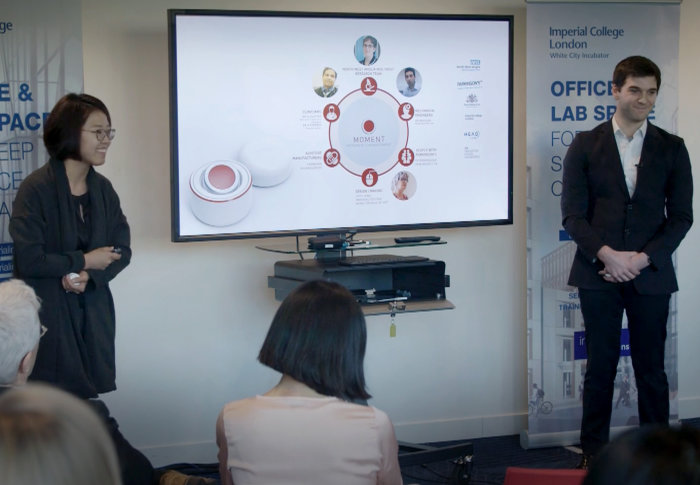Student startup aims to treat Parkinson’s symptoms with wearable device

A startup founded by an Imperial student is developing a device to help Parkinson’s Disease sufferers move more easily.
One of the disorder’s most common symptoms is slow movement, and early-stage testing indicates that the non-invasive device under development by medical technology startup TheMoment could help patients walk, move their hands and use tools more quickly, easily and smoothly by delivering vibrations to the chest.
The technology draws on the combined expertise in product design and medicine of founders Lucy Jung, a student on Imperial and the Royal College of Art’s Master’s programme in Innovation Design Engineering, and Dr Floyd Pierres, a doctor at Addenbrooke’s Hospital.
Building on historical research
The pair, who have been supported by Imperial’s entrepreneurship programmes, say they hope to build on insights that they trace back to neurologist Jean-Martin Charcot in the 19th century.
“It was Professor Charcot who noticed that his patients’ symptoms would be better if they visited him than if he visited them at their homes, and postulated that it might be the journey in by horse drawn carriage. He developed his own vibrating chair. That was 200 years ago, and nothing much has happened until the last few decades, when we’ve had a development in understanding of how movement works and how sensory information is really important in enabling that movement,” said Dr Pierres.
Research suggests that vibrations may help relieve Parkinson’s symptoms and reduce beta wave activity in the brain, which is often found in Parkinson’s disease sufferers and lowered by peripheral stimulations.
The pair have also gained insight by talking to present-day Parkinson’s sufferers. “One of the gentlemen we spoke to said that when he sits on his massage chair, it really helps with his symptoms,” said Ms Jung. “We developed a lot of prototypes. The device we’re now developing uses medical adhesive, sits on the sternum and gives a vibrotactile stimulation and reduces symptoms of stiffness and slowness.”
Early testing on 13 patients found that TheMoment’s M-co device improved movement speed by an average of 16%. The team is currently carrying out further tests and aims to begin manufacturing the device at large scale in the third quarter of 2020.
Entrepreneurship support at Imperial
Ms Jung and Dr Pierres have been supported in their journey by some of the entrepreneurship services and programmes that Imperial offers its students and researchers.
They first approached the Enterprise Lab, the College’s hub for student entrepreneurship. Through that, they discovered the White City Innovators’ Programme, a five-week pre-accelerator offered by the Imperial White City Incubator that is designed to support concept-stage entrepreneurs as they develop their ideas.
“It was the Innovators’ Programme that first brought us ‘out of the lab’,” says Ms Jung. “That was definitely the one that made us go, ‘it’s going to be hard, but we can do this’.”
The pair received mentoring through the programme from Dr Govind Pindoria, Imperial’s Associate Director of Startup Formations, who now sits on TheMoment’s board of directors.
“Govind hasn’t forced anything on us at all. Rather than telling us what to do, he has supported our thought process – asking questions. He’s actually developed us,” said Dr Pierres.
They also benefited from the opportunity to mix with other founders. “I think the programme opened a network as well. We saw pitches from all sorts of businesses. You see how each team pitches in their own way, and you learn from that. And then those networks, you just spread out. The Innovators’ Programme was excellent for mentorship and building a network that has really grown naturally from there,” Dr Pierres said.
“It’s fantastic to see how TheMoment has progressed from a concept to a potentially transformational startup since taking part in the Innovators’ Programme. We aim to help all our participants gain the insights they need to make their ideas into realities and TheMoment are a perfect example of how mentoring can add immense value to an early stage company,” said Richelle McNae, Entrepreneurial Programmes Co-ordinator at the Incubator.
Re-evaluating entrepreneurship
Ms Jung and Dr Pierres said that through Dr Pindoria’s mentoring they came to understand the attributes required for entrepreneurship differently.
Ms Jung explained: “I remember a conversation, in the early days, where we said we didn’t feel like we were right for the business because we were not interested in the commercial side. Then Govind questioned us further on what we thought the requirements were and I said, ‘strong vision, then the second thing is perseverance, and the third responsibility’. Govind came back and said, ‘Is responsibility, vision and perseverance what you have?’ and it was just the motivation we needed.”
Med tech support
TheMoment is now participating in the Imperial-led accelerator MedTech SuperConnector, which offers training, community and financial support to med tech (medical technology) ventures.
“MedTech SuperConnector is really special because they’re quite technology-focused, with lots of research going on. It’s a really nice cohort and we became quite good friends with the other teams really quickly because we’re going through the same thing. The vision is really similar for all the cohort, even though we’re all in different stages. And we are teaching each other with the challenges we face as med tech startups such as clinical trial and regulatory approvals,” said Ms Jung.
Article text (excluding photos or graphics) © Imperial College London.
Photos and graphics subject to third party copyright used with permission or © Imperial College London.
Reporter
David Silverman
Communications Division